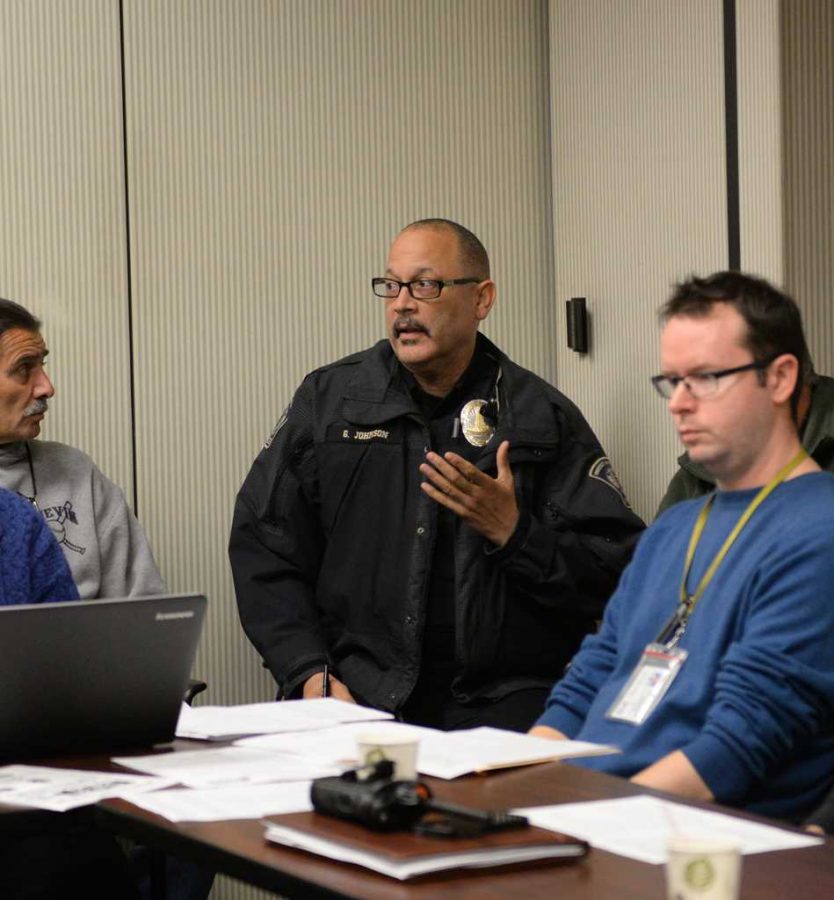At this month’s Oakwatch meeting, Oakland residents reviewed the neighborhood’s improvements in community policing and frustrations with transparency over the fall semester.
Oakwatch members, who identify and attempt to resolve code violations in Oakland, held their monthly meeting 3 p.m. Wednesday at the Jewish Federation of Greater Pittsburgh to discuss property, Pitt student conduct and satisfaction with community policing efforts. Permanent residents of Oakland, Pitt Student Government Board, Pitt police, city police and Pitt and city officials deliberated over the state of the neighborhood and behavior of student residents, rejoicing over the fall semester’s quiet party scene.
Though members discussed everything from graffiti to excessive trash on McKee Place, they fleshed out their thoughts on the successful community policing and newly instituted rental registry at this month’s meeting.
Here are four takeaways from Wednesday afternoon’s gathering.
Pitt police improve community policing efforts
During the fall semester, Pitt police officer Guy Johnson said Pitt police responded to 140 parties that students had thrown in their homes. But, Johnson said, of the five parties broken up in December, Pitt police didn’t cite any students.
Instead, Johnson said Pitt police followed up with student offenders through knock-and-talks, in which officers visit student homes and discuss the violations that occurred on the property. Johnson said knock-and-talks help students to be aware and respectful of Oakland’s non-student residents.
In a report he presented at the meeting, Johnson said Pitt police recorded officers’ responding to 84 violation incidents in December, 32 of which resulted in citations. Of those citations, Pitt students received 24.
“You may have some complaints, but [compared to other universities], a lot of good has been done,” Johnson said. “Look where we’re at as a university — we’re in a pretty good position.”
Oakland residents request more transparency from Pitt’s Student Conduct Office
Despite Pitt police’s efforts to reprimand — rather than cite — students who throw parties, Oakwatch members said they want more transparency from Pitt’s Student Conduct Office regarding student violations.
At Pitt, when police catch a student who is drinking underage and choose not to cite the student, officers refer the student for judicial action through Pitt’s Student Conduct Office. Oakwatch members raised concerns about what happens after the Pitt police refer students to the University.
Several Oakwatch members expressed frustration with the privacy surrounding the outcome of violations of student conduct, saying the cases seem to disappear into a “black hole.”
Barbara Ruprecht, Pitt’s student conduct officer said she couldn’t release information about student referrals because, under the Family Educational Rights and Privacy Act, they are a part of students’ private records.
When police refer a student to the Student Conduct Office, the office issues sanctions against the student, which include an education program, a fine and a mark on the student’s record.
Though Oakwatch members requested a monthly report from the University outlining the numbers and kinds of violations students commit in Oakland — excluding students’ names — Ruprecht said she is unlikely to institute a monthly report, although the annual For Safety’s Sake report includes all of the violation information from the previous year.
“We have no agenda to avoid addressing bad behavior in the community,” Ruprecht said in response to the requests for students’ information. “[Students are] a part of the community, you have to behave yourself. You don’t get to come here for four years and do whatever you want.”
Oakwatch members pleased with quiet fall semester
Despite their frustration about transparency, Oakwatch members discussed the neighborhood’s unusually quiet fall semester.
Many of the members commented that this past fall has been one of the neighborhood’s quietest in regard to parties and noise complaints from student rental properties.
Rebekkah Ranallo, communications manager at OPDC, said the smooth semester was due to cooperation between neighborhood organizations and Pitt students.
“Oakwatch [and] the collaboration between residents, OPDC, Pitt and Pittsburgh police [are] working together to make the city livable and quiet,” Ranallo said. “It takes a whole coalition of partners to bring change.”
To prevent student violations from occurring in the first place, Kannu Sahni, Pitt’s director of community relations, emphasized the importance of engaging students in activities such as the student tenant workshop in December.
“We did a lot to engage and inform our students,” Sahni said. “All those activities are building toward probably a better outcome for next year.”
City defends rental registry
Corey Buckner, the community affairs manager for the city of Pittsburgh, gave an update on the rental registry, a program city legislators passed in December that requires landlords to register their properties, at the Oakwatch meeting.
The rental registry also requires landlords to pay a $65 fee for each unit they own in order to cover the costs of inspections every three years in an effort to reduce health and safety violations in residential buildings. The city relies on other residents to report unregistered units through the 311 line.
“It’s not a program attacking good landlords,” Buckner said. “At the end of the day, the city of Pittsburgh has an obligation to protect its residents.”
Buckner and Neil Manganaro, the city council president’s community relations manager, both confirmed that a group of landlords has filed a lawsuit against the city for instituting the registry.
Though the rental registration applies to all Pittsburgh neighborhoods, the initiative will serve to protect Pitt students living off campus from negligent landlords and dangerous properties.
“For Oakland, specifically, it’s going to be very beneficial for students,” Buckner said.



